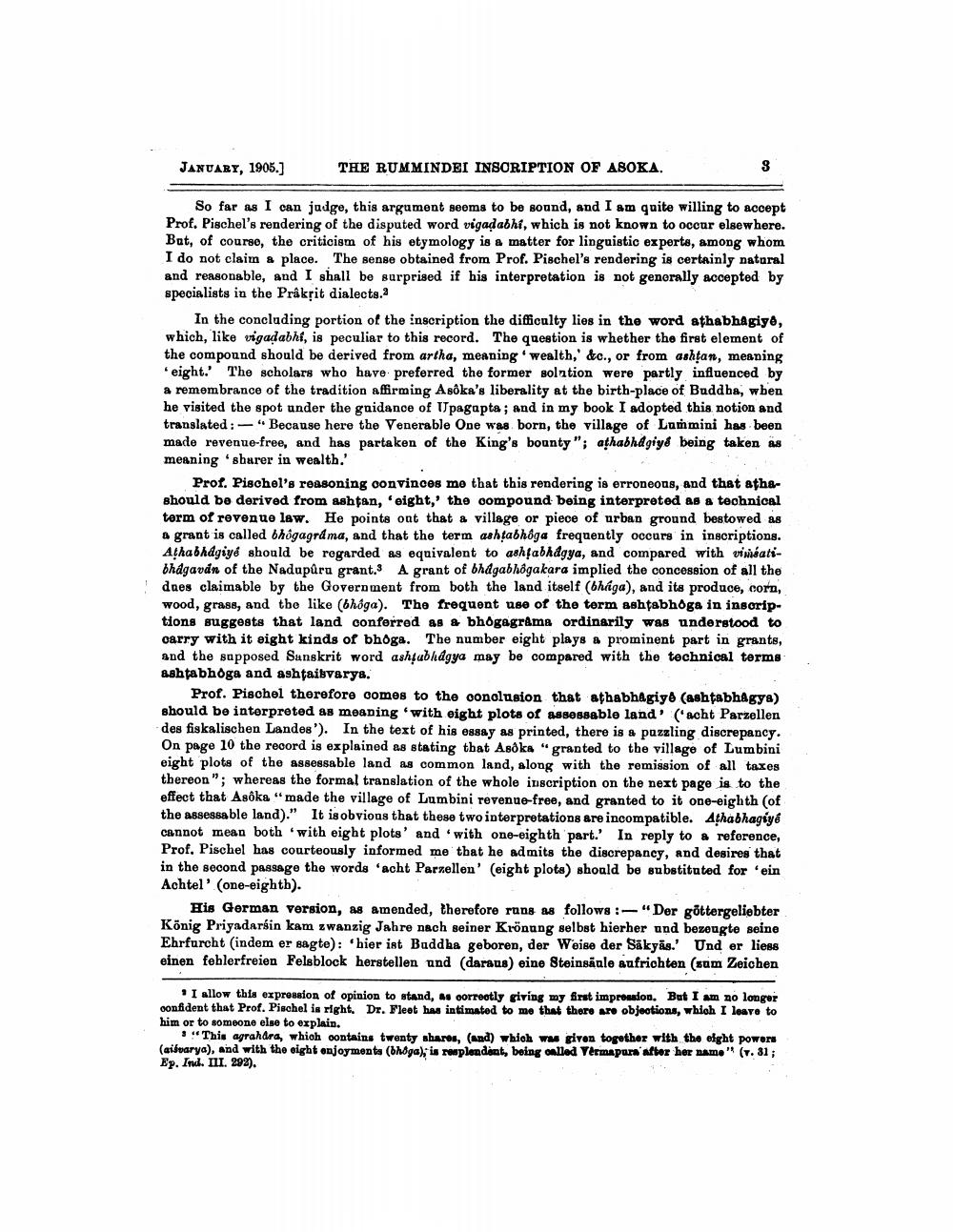Book Title: Indian Antiquary Vol 34 Author(s): Richard Carnac Temple Publisher: Swati Publications View full book textPage 9
________________ JANUARY, 1905.) THE RUMMINDEI INSCRIPTION OF ABOKA. So far as I can judge, this argument seems to be sound, and I am quite willing to accept Prof. Pischel's rendering of the disputed word vigadabhi, which is not known to occur elsewhere. Bot, of course, the criticism of his etymology is a matter for linguistic experts, among whom I do not claim a place. The sense obtained from Prof. Pischel's rendering is certainly natural and reasonable, and I shall be surprised if his interpretation is not generally accepted by specialists in the Prákțit dialects. In the concluding portion of the inscription the difficulty lies in the word athabhagiye, which, like vigadabhi, is peculiar to this record. The question is whether the first element of the compound should be derived from artha, meaning wealth,' &c., or from ashtan, meaning eight. The scholars who have preferred the former solution were partly influenced by a remembrance of the tradition affirming Asôka's liberality at the birth-place of Buddha, when he visited the spot under the guidance of Upagapta; and in my book I adopted this notion and translated :- " Because here the Venerable One was born, the village of Lummini has been made revenue-free, and has partaken of the King's bounty"; athabhdgiyê being taken as meaning 'sharer in wealth.' Prof. Pischel's reasoning oonvinces me that this rendering is erroneons, and that athashould be derived from ashtan, eight, the compound being interpreted as a technical term of revenue law. He points out that a village or piece of urban ground bestowed as a grant is called thógagrdma, and that the term ashtabhôga frequently occurs in inscriptions. Atha bhdgiye should be regarded as equivalent to ashtabhagya, and compared with viwéatibhagavdn of the Nadupüra grant. A grant of bhdgabhôgakara implied the concession of all the daes claimable by the Government from both the land itself (thága), and its produce, corn, wood, grass, and the like (thôga). The frequent use of the term ashtabhoga in inscriptions suggests that land conferred as & bhogagrema ordinarily was understood to carry with it eight kinds of bhoga. The number eight plays a prominent part in grants, and the supposed Sanskrit word ashtabhagya may be compared with the technical terms Ashtabhoga and ashfaibvarys. Prof. Pischel therefore comes to the oonclusion that athabhagiya (ashtabhagya) should be interpreted as meaning 'with eight plots of assessable land' ('acht Parzellen des fiskalischen Landes'). In the text of his essay as printed, there is a pazzling discrepancy. On page 10 the record is explained as stating that Asðka "granted to the village of Lumbini eight plots of the assessable land as common land, along with the remission of all taxes thereon"; whereas the formal translation of the whole inscription on the next page is to the effect that Asöka "made the village of Lumbini revenue-free, and granted to it one-eighth (of the assessable land)." It is obvious that these two interpretations are incompatible. Athabhagiye cannot mean both with eight plots' and with one-eighth part.' In reply to a reference, Prof. Pischel has courteously informed me that he admits the discrepancy, and desires that in the second passage the words 'acht Parzellen' (eight plots) should be substituted for 'ein Achtel' (one-eighth). His German version, as amended, therefore runs as follows:- "Der göttergeliebter König Priyadarsin kam zwanzig Jahre nach seiner Krönung selbst hierher und bezougte seine Ehrfurcht (indem er sagte): "hier ist Buddha geboren, der Weise der Säkyäs. Und er liess einen fehlerfreien Felsblock herstellen und daraus) eine Steinsäule aufrichten (sum Zeichen I allow this expression of opinion to stand, as correctly giving my first impression. But I am no longer confident that Prof. Pischel is right. Dr. Fleet has intimated to me that there are objections, which I leave to him or to someone else to explain. "This agrahara, which contains twenty sharos, (and) which was given together with the eight powers (aibvarya), and with the right onjoyments (broga); is resplendent, being onlled Yerma para after her namo" (v. 31; Ep. Ind. III. 292).Page Navigation
1 ... 7 8 9 10 11 12 13 14 15 16 17 18 19 20 21 22 23 24 25 26 27 28 29 30 31 32 33 34 35 36 37 38 39 40 41 42 43 44 45 46 47 48 49 50 51 52 53 54 55 56 57 58 59 60 61 62 63 64 65 66 67 68 69 70 71 72 73 74 75 76 77 78 79 80 81 82 83 84 85 86 87 88 89 90 91 92 ... 548
